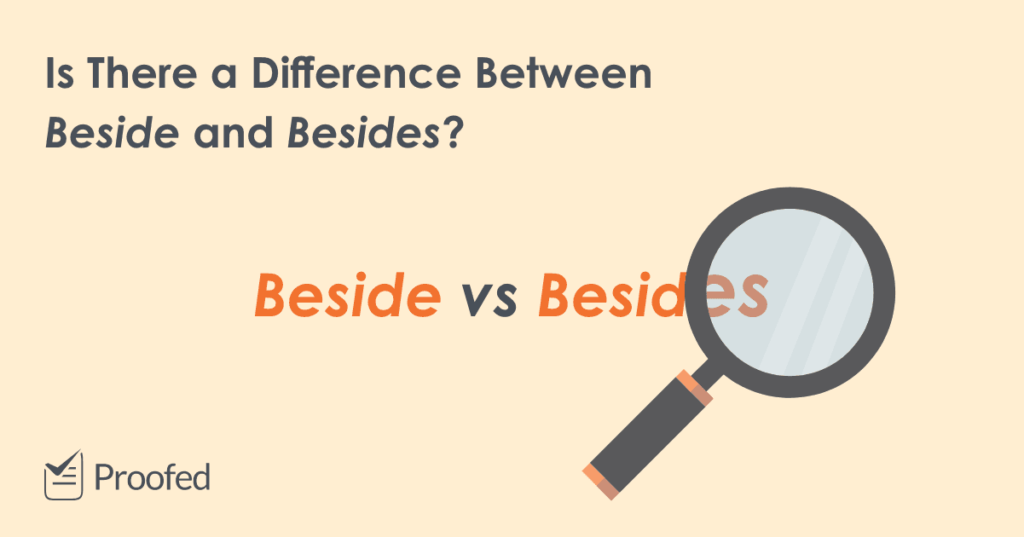One little ‘s’ can make a lot of difference! Although they’re spelled the same otherwise, ‘beside’ and ‘besides’ have different meanings and uses. And our handy guide will help you use these terms correctly in your writing.
Beside (Next To)
The word ‘beside’ is a preposition that means ‘next to’. For example:
We put the photo beside the clock on the shelf.
They sat beside each other on the bench.
It can also be used to mean ‘in comparison to’:
My phone seems very old-fashioned beside yours.
More informally, you can also be ‘beside yourself’ with a feeling or emotional reaction, meaning that you’re overwhelmed by it or feeling out of control (e.g. to be ‘beside yourself’ with rage or excitement).
Finally, ‘beside the point’ is a common phrase meaning ‘not important’:
We were talking about work, so my hobbies are beside the point!
Importantly, these uses all use the spelling ‘beside’ (no final ‘s’). As such, saying ‘besides yourself’ or ‘besides the point’ will always be an error.
(Photo: Rijan Hamidovic)
Besides (In Addition To)
Spelled with an extra ‘s’, ‘besides’ can be a preposition or an adverb. As a preposition, it means ‘in addition to’ or ‘apart from’:
Find this useful?
Subscribe to our newsletter and get writing tips from our editors straight to your inbox.
Besides writing, he also paints and cooks.
I have no other interests besides writing.
It is similar as an adverb, typically meaning ‘in addition’ or ‘also’:
I can get this done, and three other things besides.
You can also use this word as a conjunctive adverb (i.e. an adverb that links to clauses or sentences). When doing this, it is usually set apart with commas (similar to words like ‘moreover’ or ‘furthermore’):
I’m busy Tuesday night, and, besides, I don’t want to go to the game.
I promised we would come; besides, we need a night out.
Take care, though! Compared to other linking terms, ‘besides’ can suggest that something is an afterthought or not quite as important as the previous point. If you need to suggest that two clauses or sentences are of equal importance, then, you may want to use another linking term.
Summary: Beside or Besides?
If you’re ever unsure whether to use ‘beside’ or ‘besides’, remember:
- Beside is a preposition that means ‘next to’ or ‘in comparison to’.
- Besides can be a preposition or an adverb. As a preposition, it means ‘in addition to’ or ‘apart from’. As an adverb, it usually means ‘in addition to’.
To make sure you can tell them apart, keep in mind that ‘besides’ means ‘in addition to’ and has one additional ‘s’. But if you would like any extra help checking your spelling, our expert proofreaders are available 24/7!
